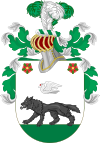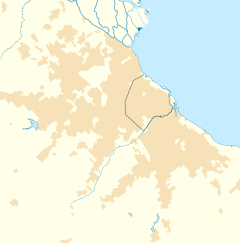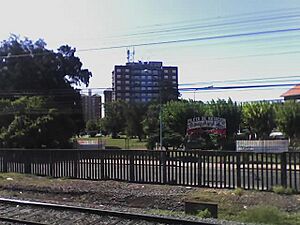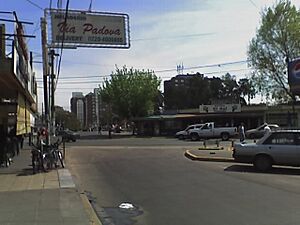San Antonio de Padua facts for kids
Quick facts for kids
San Antonio de Padua
|
||
|---|---|---|
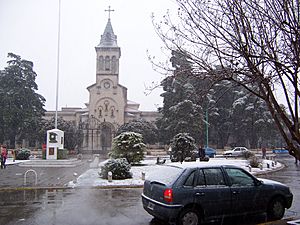
The Church of San Antonio de Padua during the July 9, 2007 snowstorm, the first in the Buenos Aires area since 1918.
|
||
|
||
| Country | ||
| Province | ||
| Partido | Merlo | |
| Elevation | 20 m (70 ft) | |
| Population
(2001 census [INDEC])
|
||
| • Total | 37,775 | |
| • Density | 6,039.2/km2 (15,641/sq mi) | |
| CPA Base |
B 1718
|
|
| Area code(s) | +54 220 | |
San Antonio de Padua, often called Padua, is a city in the Greater Buenos Aires area of Argentina. It is part of the Merlo Partido (a type of local government area). The city covers about 6.25 square kilometers and has a population of around 38,000 people.
The city's name honors a village founded in 1755 by Francisco de Merlo. That village was called Villa San Antonio del Camino, named after the Portuguese saint Anthony of Padua.
Padua is located on important train and road routes. This means it is well connected to other major cities in the western part of Greater Buenos Aires.
The city shares borders with Ituzaingó to the north and east. Other parts of Merlo are to its west and southwest. Libertad is to the south.
Padua is mostly flat and has low buildings, usually no more than two stories high. Because of this, the tall spire of the Church of San Antonio de Padua can be seen easily. This church is in the middle of a quiet neighborhood with many white houses that have red tile roofs. The church opened in 1931. A few years later, a Franciscan monastery and a Catholic school were built next to it. The church was built in a Romanesque style and is one of Padua's most famous buildings.
The main shopping area is along Avenida Noguera. It stretches for six blocks from the train station, Estación San Antonio de Padua, towards the east.
San Antonio de Padua officially became a city on September 11, 1974. This was decided by the Buenos Aires Province Legislature.
History of San Antonio de Padua
Before the 1920s, the land where Padua now stands was mostly open pasture for animals. This area, between the towns of Ituzaingó and Merlo, had many farms.
In 1919, some members of the British community started the Ituzaingó Golf Club here. The golf club was named after the nearby town of Ituzaingó. Many of its first members worked for the British-owned railway company. This company, called the Buenos Aires Western Railway Co., ran the train line from 1890 to 1946.
To make it easier to reach the golf course, the railway company opened a train stop in 1923. It was only 10 meters from the golf club. At the opening ceremony, members of the Catholic clergy were present. The train stop was dedicated to Saint Anthony of Padua. Over the next few years, the train stop and the area around it became known as San Antonio de Padua.
The town began to grow in the 1930s. The first houses were built near the train station. The main church opened in 1931. San Antonio de Padua grew steadily over the decades and became very active in the 1950s.
By the 1970s, the shopping area of San Antonio de Padua became very important. It was built around the main street, Avenida Noguera, and near the train station. This area became the most important shopping district in the entire Merlo Partido.
Sports in Padua
Club San Antonio de Padua (CASA de Padua) is the city's main sports club. It was founded on December 12, 1926. At its facilities, people can play many different sports. These include basketball, hockey, tennis, and rugby. In 1995, the club's rugby team played in the top division of the Buenos Aires Rugby Union (URBA) championship.
Sports Clubs in Padua
- Club Atlético San Antonio de Padua
- CASA de Padua Rugby Club
- Ituzaingó Golf Club
See also
 In Spanish: San Antonio de Padua (Buenos Aires) para niños
In Spanish: San Antonio de Padua (Buenos Aires) para niños
 | Lonnie Johnson |
 | Granville Woods |
 | Lewis Howard Latimer |
 | James West |


